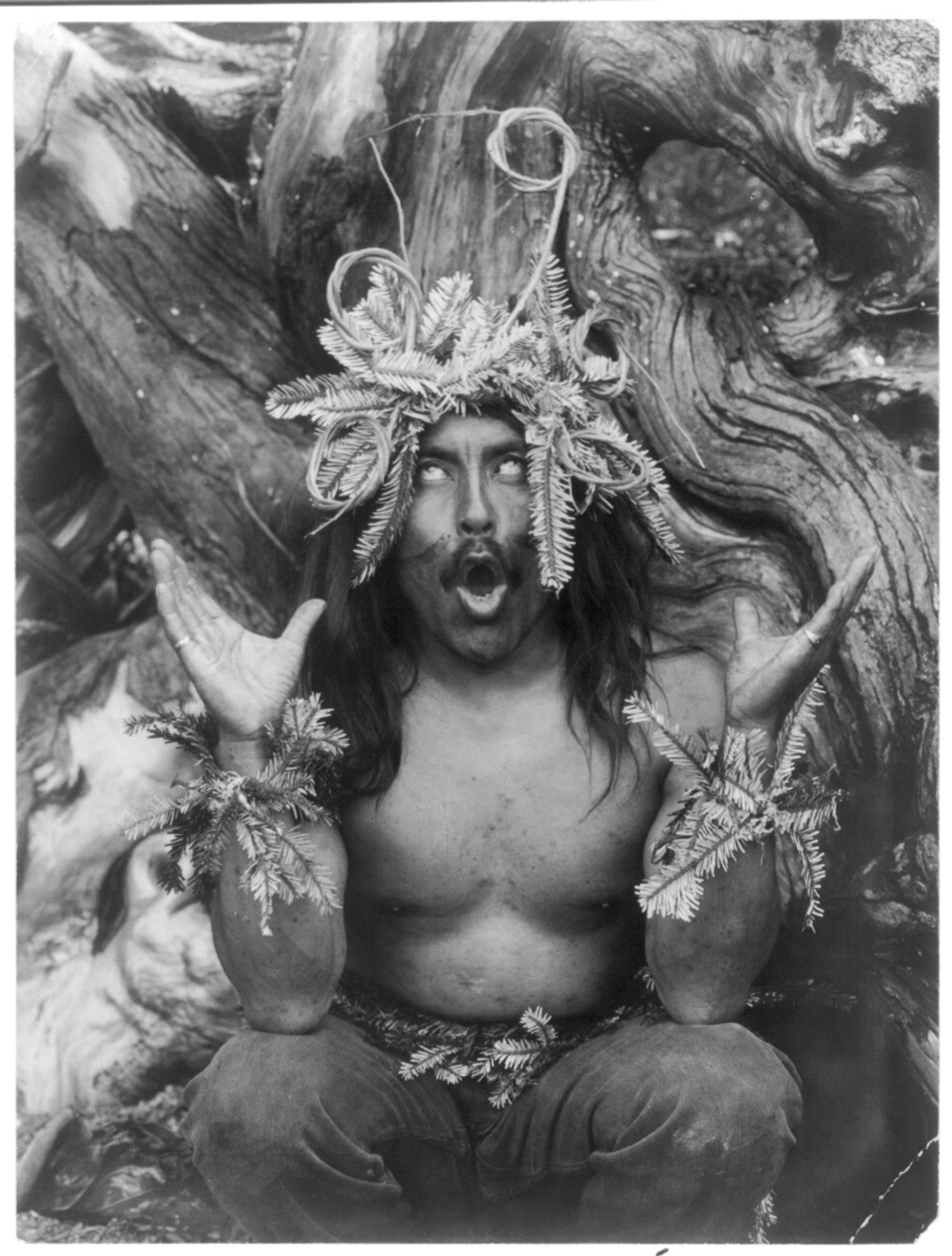 |
| Hamatsa Shaman. 1914. |
Hunter Gatherer Religions
For hundreds of thousands of years, our ancestors lived in small bands
hunting and gathering to survive. We can glean a sense of what their religious
life might have been like by looking at the traditions of modern isolated
tribes in places like Brazil, Africa, and New Guinea. These societies hold
beliefs in invisible agents who are responsible for diseases, weather, and
other natural events.[1]
These agents tend to be quite amoral and whimsical, and most tribal societies
don’t use them to inspire proper moral behavior.[2]
Given that humans evolved to be cooperative and compassionate within small
groups, these tribes tend to be good at maintaining social harmony on their own
without religious inspired moral doctrines.[3]
Another common element in these societies is the presence of an individual
(e.g. a shaman) whose sole function is to communicate with these invisible
agents to ask favors on the tribe’s behalf.[4]
As the scholar Mircea Eliade wrote, “What is fundamental and universal is the
shaman’s struggle against what we could call ‘the powers of evil.’ … It is
consoling and comforting to know that a member of the community is able to see
what is hidden and invisible to the rest and to bring back direct and reliable
information from the supernatural worlds.”[5]
Religions of Chiefdoms and State
Societies
While most hunter gatherer societies had very little political or
religious organization, as they evolved to chiefdoms and state societies, politics
and religion needed to become more sophisticated in order for these cultures to
function.[6]
Oftentimes, those who spoke on behalf of the gods ended up gaining political
control of these societies.[7]
They would use their special connection to the gods to legitimize their right
to rule, and some would even claim to be gods themselves. For example, the pharaohs
of ancient Egypt were believed to be gods, and many Roman emperors were also
deified.[8][9]
Since these societies tended to have far more than 150 constituents (the
maximum size for a cohesive social unit,) formalized moral and ethical codes
were essential for maintaining social harmony.[10]
In addition, incorporating divine retribution for moral indiscretions was an
effective way of ensuring citizens would follow the rules, even when no one was
looking.[11]
These divine laws were generally only applied to fellow adherents of any
particular religion. Given that these larger societies were often in conflict
with neighboring chiefdoms/states, religious intolerance was a useful way to
inspire nationalism and motivate citizens to kill political/cultural enemies.[12]
In short, as human civilizations became increasingly complex, religion
functioned as a mechanism to maintain social harmony and to further the aims of
the political elite.
Evolution of Mythology
As I define it, mythology encompasses the stories behind the gods,
spirits, and/or agents who are venerated by a particular religious tradition. In
the book When They Severed Earth
from Sky: How the Human Mind Shapes Myth archaeologist Elizabeth Wayland Barber and her historian husband
Paul T. Barber argued that these stories were the method by which ancient
humans would transmit vital information over many generations.[13]
As time went on, only a few elements of the original stories would remain, thus
obfuscating their initial meanings. For example, what does a one-eyed monster
that bellows from on top of a mountain and hurls boulders at people sound like?
According to the Barbers, the original story of the Cyclops may have actually
been a tale to warn people about the dangers of a volcano.[14]
In ancient societies, this morphing of mythology became exacerbated as
different cultures interacted with one another and merged. Oftentimes, the
character of certain gods would change as the cultural contexts shifted. For
example, Poseidon, the Greek god of the sea, was originally an Indo-European
horse god that assimilated the qualities of several Near Eastern aquatic
deities.[15]
As the culture took on more of a seafaring role, his aquatic qualities overtook
his original equestrian ones. Eventually, when Rome became the dominant culture
of the west, they used Poseidon as the template for their own god Neptune.[16]
Survival of the Fittest Religion
The survivability of a religion depended on its ability to spread its
message, to adapt to changes in cultural/historical contexts, and its
compatibility with human psychology.[17]
For example, some religions were successful because of their endorsement of militarism, they
required members to have many children and proselytize to the masses, or
because they promoted a worldview that was very comforting.[18] Ultimately, religions have to be infectious, persistent, and useful to the
success of their host society in order to survive.
Conclusion
For many religious people, the fact that their religion survived while
many others failed is proof that their god is the real God. However, all this
really shows is that their religion was better at adapting, spreading, and
surviving than other belief systems. For many spiritual but not religious
types, the similarity between religions and the proliferation of supernatural
beliefs are evidence that, as Cee Lo Green put it, “all religion’s true.”[19]
What this really means is that all religions were created by humans for humans,
and many stem from the same or similar cultural traditions.
Resources:
Great Lecture by Jared Diamond on the Evolution of Religions:
Good Article on the Survivability of Religions:
Great Book on Mythology:
Good Article on the Cultural Evolution of Religion:
No comments:
Post a Comment